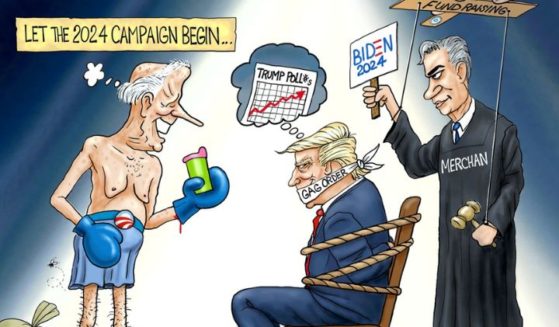Putin Brings Up Old Clinton Discussion in Explosive Speech: 'Something I've Never Talked About Publicly'
Russian leader Vladimir Putin indicated Monday that America was not warm to the idea of Russia joining NATO when former President Bill Clinton was in Moscow in June 2000.
“I’ll tell you something I’ve never talked about publicly. During his visit to Moscow in 2000, I asked Bill Clinton how US would view Russia’s NATO membership. I won’t reveal the details, but the reaction was extremely restrained,” one translation of Putin’s remarks said.
The comment was part of Putin’s speech rationalizing Russia’s actions against Ukraine.
Putin: I’ll tell you something I’ve never talked about publicly. During his visit to Moscow in 2000, I asked Bill Clinton how US would view Russia’s NATO membership. I won’t reveal the details, but the reaction was extremely restrained. pic.twitter.com/yj4WiyG9sa
— Lucian Kim (@Lucian_Kim) February 21, 2022
That’s not quite how The New York Times saw it at the time, according to an archive report.
“Mr. Clinton … used a speech accepting a prestigious European award to appeal to western Europeans to admit Russia, eventually, to both NATO and the European Union,” the Times reported in 2000.
In 2017, according to The Associated Press, Putin gave a slightly different version of what took place in 2000 in an interview with filmmaker Oliver Stone.
“During the meeting, I said: ‘Let’s consider an option that Russia might join NATO,’” Putin said. “Clinton said ‘Why not?’ But the U.S. delegation got very nervous.”
Putin says he asked Bill Clinton in 2000 about Russia joining NATO. pic.twitter.com/mZLYI8DZLa
— The Post Millennial (@TPostMillennial) February 21, 2022
Although exactly what Clinton or Putin said at the time may be in dispute, there is agreement that the expansion of NATO undertaken by Clinton stirred Russian animosity.
A Cato Institute report in December by Ted Galen Carpenter argued that the Clinton administration pushed Russia further from the West.
“The Clinton administration’s arrogant, utterly tone‐deaf policy wasted the opportunity for a lasting rapprochement between the West and Russia. When the 1990s drew to a close, the momentum toward a new cold war was well underway, and it has grown steadily worse over the following decades,” he wrote.
In the essay, Carpenter quoted former U.S. Ambassador to the Soviet Union Jack F. Matlock Jr. on how Clinton’s NATO expansion impacted relations with Russia.
“The effect on Russians’ trust in the United States was devastating. In 1991, polls indicated that about 80 percent of Russian citizens had a favorable view of the United States; in 1999, nearly the same percentage had an unfavorable view,” Matlock said.
One expert said the Clinton administration vowed to protect Eastern Europe.
“They believed that the United States could bring them into the West, which was what they wanted. And they believed that the United States could protect them if Russia ever became aggressive again,” James Goldgeier, an American University professor, told NPR for a piece published in January.
NATO expanded at first with the Czech Republic, Hungary, and Poland; then added Romania, Bulgaria and the Baltic states of Estonia, Latvia, and Lithuania; and later added Albania and Croatia, NPR reported.
“Obviously, the more it did to stabilize the situation in central and Eastern Europe and bring them into the West, the more it antagonized the Russians,” Goldgeier said.
Truth and Accuracy
We are committed to truth and accuracy in all of our journalism. Read our editorial standards.












